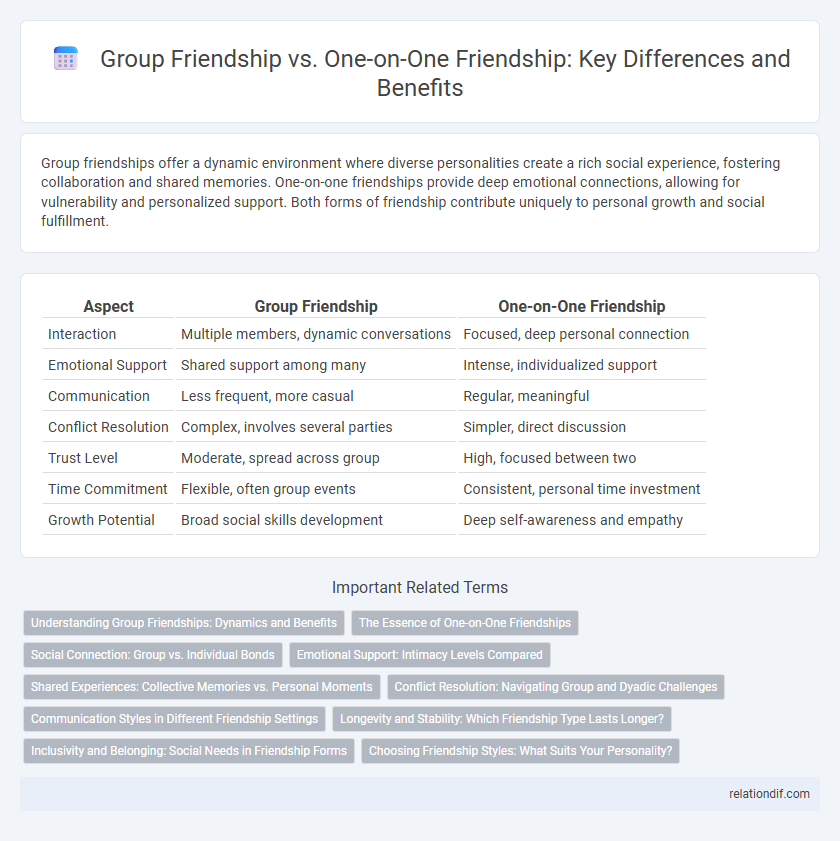Group friendships offer a dynamic environment where diverse personalities create a rich social experience, fostering collaboration and shared memories. One-on-one friendships provide deep emotional connections, allowing for vulnerability and personalized support. Both forms of friendship contribute uniquely to personal growth and social fulfillment.
Table of Comparison
| Aspect | Group Friendship | One-on-One Friendship |
|---|---|---|
| Interaction | Multiple members, dynamic conversations | Focused, deep personal connection |
| Emotional Support | Shared support among many | Intense, individualized support |
| Communication | Less frequent, more casual | Regular, meaningful |
| Conflict Resolution | Complex, involves several parties | Simpler, direct discussion |
| Trust Level | Moderate, spread across group | High, focused between two |
| Time Commitment | Flexible, often group events | Consistent, personal time investment |
| Growth Potential | Broad social skills development | Deep self-awareness and empathy |
Understanding Group Friendships: Dynamics and Benefits
Group friendships thrive on diverse interactions and shared experiences, fostering a sense of belonging and collective support that enhances social skills and empathy. These dynamics allow individuals to navigate complex social roles, develop teamwork abilities, and benefit from varied perspectives, which one-on-one friendships may lack. Group settings also offer resilience through multiple connections, enabling broader emotional resources and conflict resolution strategies.
The Essence of One-on-One Friendships
One-on-one friendships provide a unique depth of emotional intimacy that group friendships often lack, allowing individuals to share personal experiences and vulnerabilities without distraction. These focused connections foster trust and mutual understanding, serving as crucial support systems during challenging times. The essence of one-on-one friendships lies in their ability to create a safe, reaffirming space for authentic communication and meaningful bonding.
Social Connection: Group vs. Individual Bonds
Group friendships foster diverse social connections by creating a network of shared experiences and collective support, enhancing feelings of belonging and community. One-on-one friendships build deeper, more personalized bonds through focused emotional exchange and trust, often leading to greater intimacy and understanding. Both forms of friendship are essential for social well-being, balancing broad social integration with individual emotional fulfillment.
Emotional Support: Intimacy Levels Compared
Group friendships provide diverse emotional support through multiple perspectives, fostering a broader sense of belonging and shared experiences. One-on-one friendships offer deeper intimacy levels, allowing for more personalized and vulnerable exchanges that strengthen emotional bonds significantly. Emotional support in one-on-one relationships tends to be more intense and focused, while group friendships create a supportive network with varied empathy sources.
Shared Experiences: Collective Memories vs. Personal Moments
Group friendships cultivate collective memories through shared experiences like events, trips, and celebrations that create a sense of belonging and unity among members. One-on-one friendships emphasize personal moments, fostering deeper emotional connections and individualized understanding between individuals. Both forms of friendship enhance social bonds but differ in the nature and depth of shared experiences.
Conflict Resolution: Navigating Group and Dyadic Challenges
Group friendships often require complex conflict resolution strategies due to the involvement of multiple perspectives and potential alliances, making communication and empathy essential for harmony. One-on-one friendships allow for more direct and personalized conflict resolution, enabling deeper understanding and quicker reconciliation. Balancing these approaches helps individuals navigate the unique challenges presented by group dynamics and dyadic interactions.
Communication Styles in Different Friendship Settings
Group friendships often rely on dynamic, multi-directional communication where quick exchanges, shared jokes, and collective decision-making dominate, promoting a lively but sometimes superficial interaction style. One-on-one friendships allow for deeper, more focused conversations where individuals can express vulnerability and explore complex emotions without the distraction of multiple voices. These differing communication styles reflect how social intimacy and attentiveness vary between group settings and individual connections, influencing the depth of understanding and emotional support.
Longevity and Stability: Which Friendship Type Lasts Longer?
Group friendships often offer diverse social interactions that can enhance longevity through shared experiences and collective support, but they may lack the intimate stability found in one-on-one friendships. One-on-one friendships typically provide deeper emotional connections and personalized understanding, contributing to greater stability and lasting bonds over time. Studies indicate that while group friendships can be more resilient to change due to multiple members, one-on-one friendships tend to endure longer due to their focused and consistent emotional investment.
Inclusivity and Belonging: Social Needs in Friendship Forms
Group friendships often enhance inclusivity and belonging by fostering diverse interactions and shared experiences among multiple individuals, creating a broader social support network. One-on-one friendships offer deeper emotional connections and personalized understanding, fulfilling the need for intimacy and individual validation. Both forms address essential social needs, with group friendships promoting a sense of community, while one-on-one relationships provide focused emotional support.
Choosing Friendship Styles: What Suits Your Personality?
Group friendships offer varied social interactions and support, ideal for extroverted personalities seeking diverse connections, while one-on-one friendships provide deeper emotional intimacy preferred by introverted individuals. Considering your personality traits helps determine whether vibrant group dynamics or focused, personal bonds align better with your social needs. Balancing these friendship styles enhances social fulfillment and emotional well-being.
Group friendship vs One-on-one friendship Infographic

 relationdif.com
relationdif.com